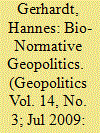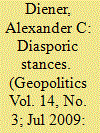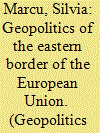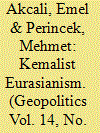|
|
|
Sort Order |
|
|
|
Items / Page
|
|
|
|
|
|
|
| Srl | Item |
| 1 |
ID:
091050


|
|
|
|
|
| Publication |
2009.
|
| Summary/Abstract |
Building on the work of Giorgio Agamben and Michel Foucault, this paper explores the critical intersection between biopolitics and geopolitics. More specifically, an analysis is performed on the discourse that has been produced by the US executive with regard to the ongoing Darfur crisis. I interpret this discourse as part of a bio-normative geopolitical calculation aimed at maintaining the US claim on the valuation of global life without, however, committing many resources to actually protecting and securing this life within a meaningful political community. This investigation points particularly to the challenge that foreign humanitarian crises pose to the legitimacy of the United States' global hegemonic ambitions. I argue that the United States has responded to this challenge by presenting itself as a global moral hegemon whose role is primarily to judge rather than act with regard to the protection of foreign human life. As the named "genocide" in Darfur continues, the United States is also forcing a devaluation of the concept of genocide itself, thus initiating a fundamental recalibration of the relation between global ethics and geopolitics.
|
|
|
|
|
|
|
|
|
|
|
|
|
|
|
|
| 2 |
ID:
091049


|
|
|
|
|
| Publication |
2009.
|
| Summary/Abstract |
This essay explores the historical geographic antecedents of migration decisions among Koreans and Germans in Kazakhstan as evidence of the importance of space-time approaches to socio-political phenomena. Both groups came to Central Asia under similar circumstances as 'punished peoples' but reacted very differently to Kazakhstan's independence. Koreans have largely opted to remain in Kazakhstan and re-imagine themselves as hybrid members of the Korean diaspora and the Kazakhstani civic nation. The majority of Germans, by contrast, have opted to migrate to Germany and abandon Kazakhstan. I argue that despite significant similarities in their historical geographic experiences within Tsarist Russia and the USSR, the unique spatio-temporal biographies of each group have configured their respective homeland conceptions differently. Contingency, rather than some a priori pattern of territorialisation, is clearly evident in each group's receptivity to migration possibilities.
|
|
|
|
|
|
|
|
|
|
|
|
|
|
|
|
| 3 |
ID:
091047


|
|
|
|
|
| Publication |
2009.
|
| Summary/Abstract |
Since the fall of the communist regimes, we have been witnessing in Europe two phenomena that dominate the geopolitical scene: on the one hand there is integration, with the advance of the borders of the European Union (EU) towards the east through its two enlargements, and on the other hand there is disintegration, as expressed by social crisis, and latent tensions and conflicts in the countries found beyond the said border. This article focuses on the geopolitical changes that came about on the eastern border of Europe (Romania-Moldova-Ukraine) and the border relations between these three countries after the fall of the Soviet Union, and the integration of Romania into the EU. This is both a multidimensional and ethno-territorial border, associated with tensions and conflict.1 Using the territorial dialectic of the globalisation argument, we are able to analyse, describe and interpret from a theoretical-empirical standpoint, the two current discussions about that border: opening by means of cooperation, or closing by means of control and security.
|
|
|
|
|
|
|
|
|
|
|
|
|
|
|
|
| 4 |
ID:
091053


|
|
|
|
|
| Publication |
2009.
|
| Summary/Abstract |
Over the past decade or so, there has been a convergence between the Eurasianist and Kemalist ideologies in Turkey. A number of Kemalist and Socialist intellectual and political actors together with sections of the military have started to articulate Eurasianism (Avrasyac?l?k in Turkish) as a new geopolitical discourse for Turkey and as an alternative to Turkey's pro-Western foreign policy orientation. In this perspective, Eurasianism stands for a political, economic and cultural alliance with 'Eurasian countries', such as Russia, Iran, and Turkic countries in Central Asia, as well as Pakistan, India and China. This article aims to deepen the analyses carried out thus far on this emerging geopolitical discourse. To this end, it contextualises the emergence of the Eurasianism in Turkey within the wider social, political and historical context of which it forms a part, including the framework of asymmetrical political and economic relations that developed between Turkey and its Western allies in the post-Cold War period.
|
|
|
|
|
|
|
|
|
|
|
|
|
|
|
|
| 5 |
ID:
091048


|
|
|
|
|
| Publication |
2009.
|
| Summary/Abstract |
This article investigates geopolitical interactions between Europe and the United States (US) in large-scale outer space application programmes, which I term transatlantic astropolitics. Europe and the US have transcended tangible geographical constraints on terrestrial territories and extended geopolitics to outer space with advanced technologies, thereby making outer space a new 'space' for transatlantic interaction. Transatlantic astropolitics reveals an instrumental rationality that both sides pursue interests with respective cost-effective calculation rather than shared norms, common culture, or collective identities. This phenomenon indicates an inconsistency between the discourse of transatlantic security community and practices of European and US individual geopolitical interest satisfaction. This article provides a coupling between theories of international relations (IR) and political geography in outer space issue area, and thereby identifies the role geopolitical thoughts play in transatlantic astropolitics. This article concludes with the validity of neo-classical astropolitics in explaining outer space activities, and cost-efficient calculation as the cause of strategic variation in transatlantic astropolitics.
|
|
|
|
|
|
|
|
|
|
|
|
|
|
|
|
| 6 |
ID:
091051


|
|
|
|
|
| Publication |
2009.
|
| Summary/Abstract |
The Syrian government and international development agencies commonly present water scarcity as being one of Syria's main development challenges. This paper draws on a set of international reports, written in consultation with Syrian officials, to reveal the politics of this scarcity. I show how water scarcity is constructed and ordered through spatial representations. Rather than accepting the common explanation that scarcity is the result of population pressure, I argue that Syria's water scarcity is a consequence of the ruling Ba th party's continuous promotion of water-intensive agriculture. This support for the agricultural sector, motivated in part by a desire for food self-sufficiency and growth through an expansion in irrigated agriculture, is linked to the rural roots of the Ba th party and the influential Peasants Union. In revealing these key national politics, this analysis highlights how geopolitical studies of water in the Middle East must move beyond a focus on inter-state dynamics and pay critical attention to the politics operating around water distribution and use on a range of scalar levels.
|
|
|
|
|
|
|
|
|
|
|
|
|
|
|
|
| 7 |
ID:
091052


|
|
|
|
|
| Publication |
2009.
|
| Summary/Abstract |
During the Cold War, "buffer" or "bastion" seemed a popular metaphor to describe Turkey. After the Cold War, "bridge," (and, to some extent, the "crossroad") metaphor started to dominate the Turkish foreign policy D?scourse.This article traces the use of "bridge" metaphor in this D?scoursein the post-Cold War period by the Turkish foreign policy elite. It develops two arguments. First, the word bridge is a "metaphor of vision" combining Turkey's perceived geographical exceptionalism with an identity and a role at the international level. As a "metaphor of vision," the employment of the word "bridge" highlighted Turkey's liminality and justified some of its foreign policy actions to Eurasia and then to the Middle East. Second, because the bridge metaphor was used in different context to justify different foreign policy choices, its meaning has changed, illustrating that metaphors are not static constructs. It concludes by Say?ng that the continuous use of "bridge" metaphor might reinforce Turkey's "liminality," placing Turkey in a less classifiable category than the regular "othering" practices.
|
|
|
|
|
|
|
|
|
|
|
|
|
|
|
|
|
|
|
|
|